Jeff Bridges’ Best Movie Is Way Stranger Than The Big Lebowski
Jeff Bridges best movie is way stranger and more emotional than his most famous role as a stoner detective in The Big Lebowski.
This article is more than 2 years old
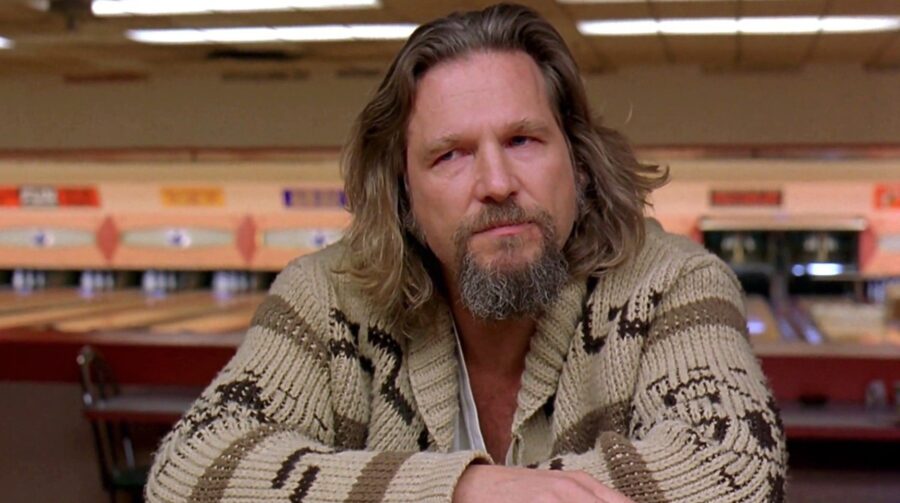
No less a personage than legendary film critic Pauline Kael said that Jeff Bridges “may be the most natural and least self-conscious screen actor that has ever lived.” High praise from a critic who thought that Orson Welles was overrated, but she is pretty spot-on with her thoughts on Bridges. If anything, his natural, seemingly-unstudied quality on-screen has worked against him. At times, it seems like Bridges sleepwalks through films, or just brings his own famously chill reputation to roles regardless of what the movie calls for. But what is easy to mistake for chillness is actually an ability to simply be the character he is portraying, rather than act as them. Without fussing with any Jared Leto-style Method frills or attempting to give himself frostbite like Leonardo DiCaprio, Bridges just is on screen. And nowhere is that best utilized than in director Terry Gilliams’ 1991 drama, The Fisher King.
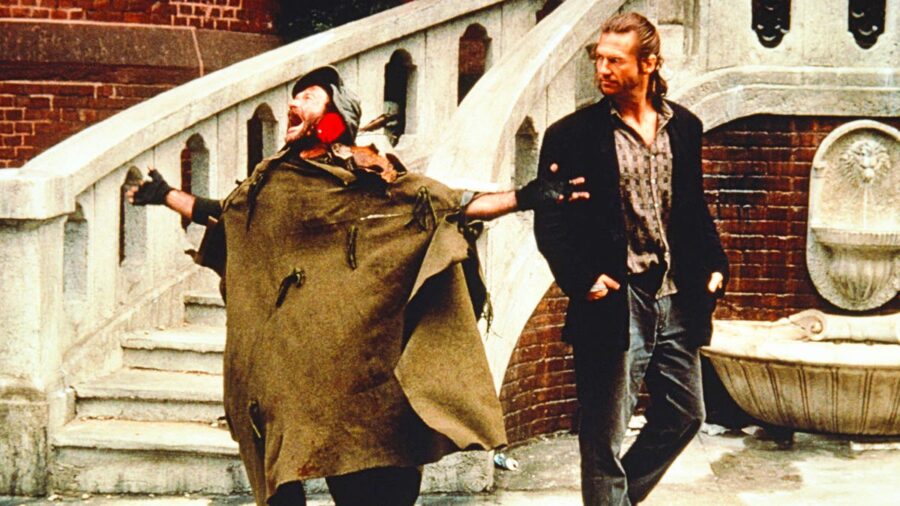
In many respects, the character Jeff Bridges plays in The Fisher King is not all that different from his most quintessential role in The Big Lebowski. Both are men deeply stuck in a rut of their lives, perpetually scruffy, barely able to function in society except in their own highly specific, constructed routines. But where Jeffrey “The Dude” Lebowski is a figure of fun, a man who has almost achieved a kind of Zen through the simplicity of his desires for White Russians, weed, and bowling, The Fisher King’s Jack Lucas is a tormented man. As the movie opens, Jack is a very different figure than follows. We first see him in a cavernous, nearly German Expressionistic sound booth in his capacity as a Howard Stern-style shock jock. Through the opening credits, we mostly hear him, unseen, dispensing insults and mockery to the sad and lonely people calling into his show. Because it’s the 1990s, we can also infer that his slicked-back ponytail and earrings mean he is a shallow and heartless person. This is accurate.
On the cusp of an enormous career leap forward, the rich and successful Jack (He rides in a limousine with David Hyde Pierce, that’s how rich he is) callously and sarcastically tells a caller that he should go out and kill yuppies. The man does, committing a mass murder-suicide in a nightclub. Three years later, we see Jeff Bridges as a different Jack. Now, he works at a tiny video store run by his girlfriend (Mercedes Ruehl, who won an Academy Award for flinty but warm performance), is drinking himself in a stupor of guilt and self-loathing. He ends up wandering the streets of New York City, preparing to drunkenly commit suicide, when two jock-ish thugs decide to make it easy on him. Mistaking him for a homeless man, they douse him in gasoline and prepare to light him on fire, when he is rescued by the other key part of the movie: Robin Williams.
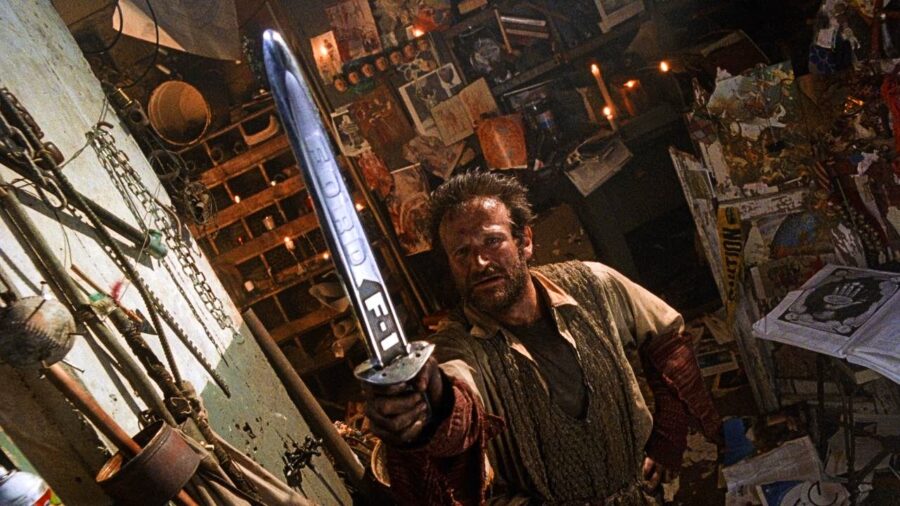
Whereas Jeff Bridges may be the most natural person to ever be on the big screen, Robin Williams was often the opposite. While Bridges is quietly internal as the often cruel and self-pitying Jack with all his trauma and doubt, Williams is sheer volume as Parry, a homeless man who believes himself to be an Arthurian knight-errant on a quest for The Holy Grail. Many comedies took Williams’ famously manic and free-associative persona and used it for cheap jokes. When he turned to drama, Williams turned out to have an equal gift for nearly silent, harrowing depths in movies like One Hour Photo and Insomnia. But The Fisher King may be the only movie to harness the chaotic energy of Robin Williams for dramatic purposes. Instead of his rants coming off like jokes, they are the misfirings of a hopelessly injured spirit. Instead of being charming and cheeky, Williams as Parry is nearly incapable of interacting with society in any kind of coherent manner.
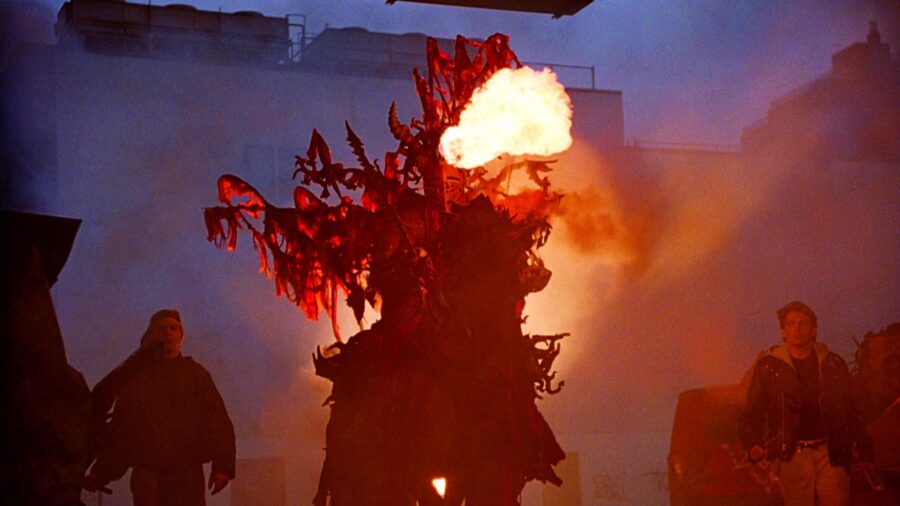
As it turns out, Parry was once a man named Henry Sagan and was present at the nightclub where the man advised by Jack committed mass murder. In a shockingly graphic flashback late in the film, we see a clean-shaven and suited Parry with his wife at the club, before a shotgun blast explodes her brains across his face. Once he finds out who Parry is, Jack is compelled to try to help him, at least at first for the selfish reason of achieving some kind of redemption. This is the beginning of Jeff Bridges’ transformation from a broken man to one trying to help the broken. And that is when the movie goes in a stranger direction. The positions of Jack and Parry begin to flow back and forth as the movie goes on, with Jack eventually taking up the role of knight-errant, and Parry falling back into a catatonic state that mirrors Jack’s apathy. By the end of the movie, The Grail is achieved, but it is with the greater understanding that it is just a cup. The desire to heal and be healed is what allows the quest to be completed, not acts of valor or guilt.
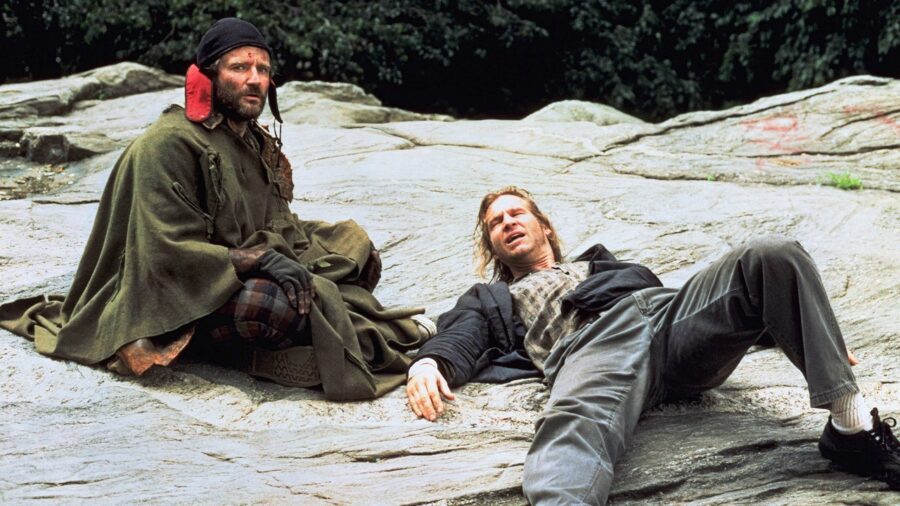
The Fisher King was Terry Gilliam’s first attempt to make a relatively straightforward, non-fantastical film (and the first without any involvement from his old partners in Monty Python). Written as a spec script by Richard LaGravenese (who would go on to write more ‘90s hits like The Bridges of Madison County and The Horse Whisperer), there is certainly still fantasy to be had in The Fisher King. Parry is pursued by a terrifying figure called The Red Knight who appears in nightmarish sequences that would be right at home in Time Bandits, but we can perceive it as Parry desperately trying to hold onto his protective fantasies. A heart-stopping beautiful sequence in which the massive crowd of commuters in Grand Central Terminal stops to waltz as Parry sees Lydia (Amanda Plummer), a clumsily charming woman he has fallen for, is the closest thing to Gilliam’s usual fantasia, but we can understand it as the expression of the mind, not reality.
Jeff Bridges would occasionally achieve the same level of casual intensity as The Fisher King with movies like Fearless. He has palled around with Carmine Falcone, and stood alongside Tron himself. He would eventually win an Academy Award for Crazy Heart in 2009, which is a fine and forgettable film. But there is nothing like the strange warmth and deep sorrow of The Fisher King, and really no other movie is. It did moderately well at the box office (which for Terry Gilliam, is an Avengers: Endgame level of success), while critics were divided. It has since been reevaluated and is generally considered a highlight of the career of everyone involved. No one has made a movie quite like it before, and likely will not again. But with Jeff Bridges still around, you never know.












